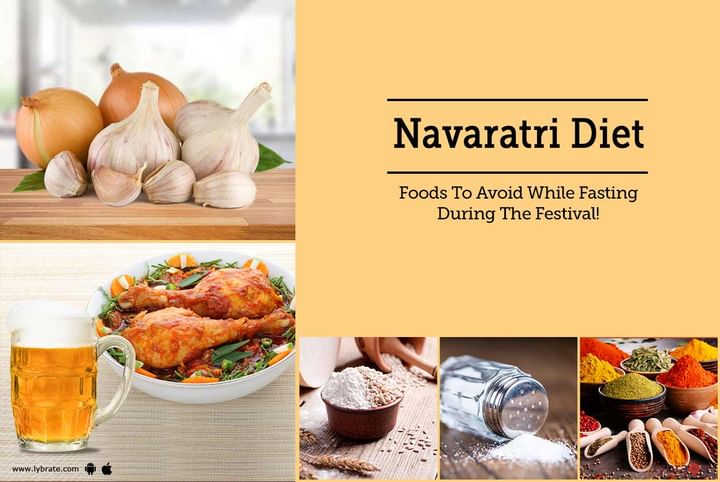Navaratri Diet: Foods To Avoid While Fasting During the Festival!
It's time for the great Indian detox! Yes, Navaratri is right here again - the festival that celebrates the victory of good over evil. It is celebrated with fasting during the day, colour-coordinated outfits and elaborate dance routines at night.
While most people mark this auspicious occasion with a fasting ritual, there is no rule of thumb to it and people can opt for a routine that they think is doable. However, there are many myths surrounding this tradition and those often end up misguiding people. But you need not worry. As Navaratri is almost synonymous with fast, we have compiled a list of food items you should avoid during these days if you are planning to fast:
- Non-vegetarian Food and Alcohol: These two proverbial 'sins' are absolutely forbidden during Navaratri. You must not consume any non-vegetarian food item or alcohol during these days of the festival. While it may sound like torture to a foodie, you have to know that your body is ready to welcome this change. Removing non-vegetarian food and alcohol from the diet will prevent you from the detrimental effects that animal fat and proteins have on your body. A diet, packed with non-vegetarian food items and alcohol, increases the risk of developing high cholesterol, diabetes, cardiovascular diseases, obesity and a number of other medical conditions. Abstaining from these during the days of Navaratri will help your body to get rid of the harmful toxins that will dissolve and get removed from the body. This period of fasting will reinvigorate and rejuvenate your body from the inside.
- Grains and Flours: Rice, rice flour, all-purpose flour (maida), wheat flour (atta), gram flour or chickpea flour (besan), semolina (rava or sooji), millet flour, corn flour are strictly prohibited during Navaratri. A diet devoid of any of these will make you avoid gluten, a protein that can give rise to inflammatory conditions. Instead of these, you can have buckwheat flour (kuttu atta) or Amaranth flour (rajgira atta), as these are full of high fibres and also rich in vitamin B, various minerals and proteins. Barnyard millet (sama chawal) can be a great replacement for rice in your diet; it tastes almost the same as rice and contains certain photo-chemicals that can lower cholesterol.
- Salt: A very common ingredient that you can't add to your food during the course of Navaratri is common salt. Instead, you can have rock salt, also known as upvaas ka namak or sendha namak, and it is also a healthier option with its relatively lower sodium content.
- Spices: Spices like turmeric (haldi), mustard (rai or sarson), asafoetida (hing), fenugreek seeds (methi), dhania (coriander powder), may rule Indian households throughout the year but are prohibited during Navaratri. During this time of the year, you can use tamarind, cloves, green cardamom, cinnamon, nutmeg and green chilli to add the much-needed flavour to your meals. Many households use cumin (jeera) as well; however, that really depends on your family and the customs they follow.
- Vegetables: Onion and garlic are two vegetables that you must not consume during the Navaratri days. Vegetables like potato, carrot, tomato, sweet potato, pumpkin, bottle gourd, raw papaya, yam, spinach etc, however, can be consumed. So, you can make a bowl of boiled vegetables the primary source of your strength during Navaratri.
Even though you would not be able to consume a lot of food items, fasting won't stop you from being hale and hearty. You can have sabudana (tapioca pearls) as your source of carbohydrates, makhana (fox nuts) as snacks rich in anti-oxidants, fibres & minerals, pulses like bengal gram and green gram as your sources of protein. There is no restriction concerning fruits in your diet and thus a bowl of fruits can be a healthy and tasty staple in your diet at this time. You can have dry fruits such as almonds, kishmish, cashew nuts, pistachio etc. for energy.
Add flavour to the Navaratri-special desserts with sugar-free halwas and laddoos this Navaratri. You can also include dairy products such as milk, ghee, butter, curd, paneer, in your diet to gain as much energy and nutrients as possible.
If detox is something that you have been thinking about for some time, then Navaratri is the perfect opportunity to do something about it. During these navaratri days, people around you will refrain from indulging in their favourite food items. Thus, you will be encouraged to abstain from the foods that you normally can't live without. You can even tweak the typical Navaratri diet by adding various yogurt preparations and different fruits to it and make sure that you stay healthy, hearty and happy throughout the festival.



+1.svg)
